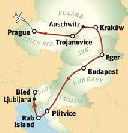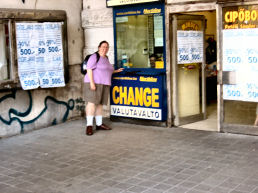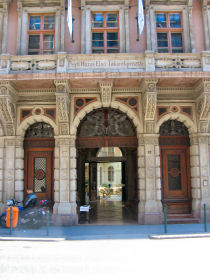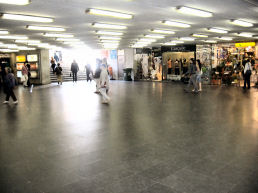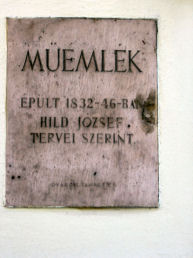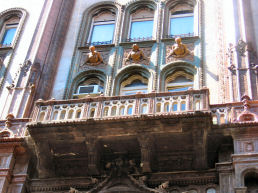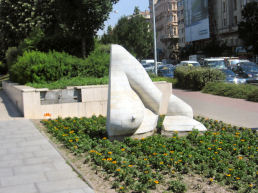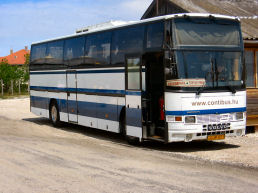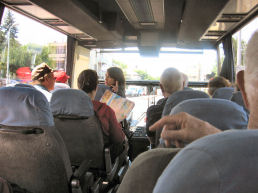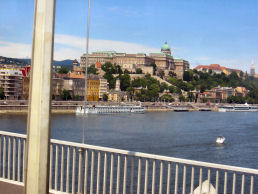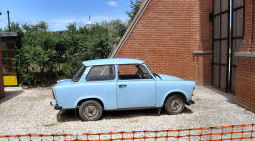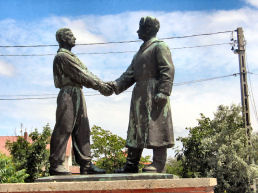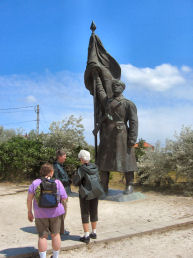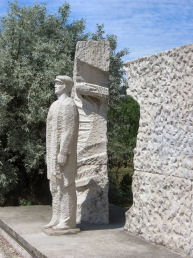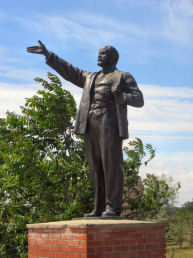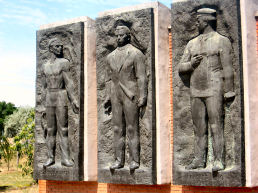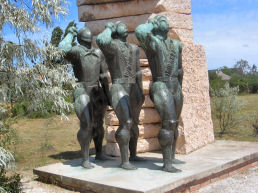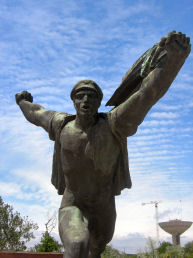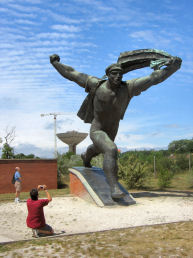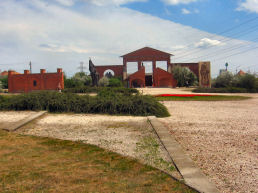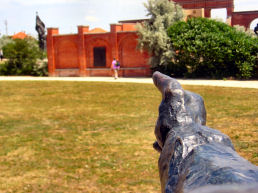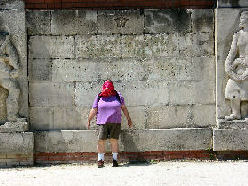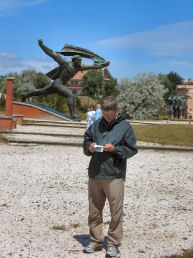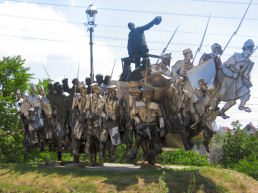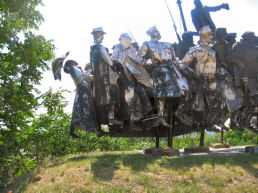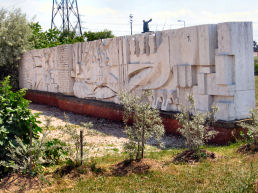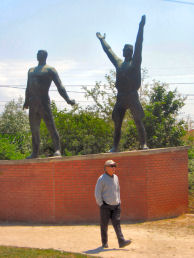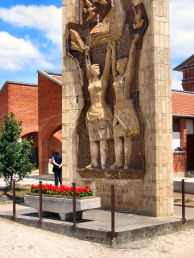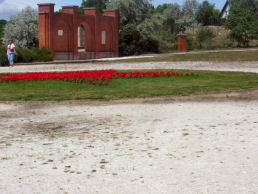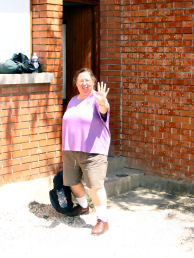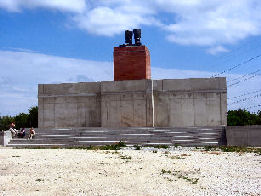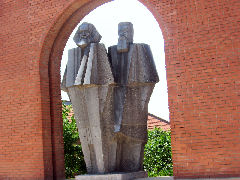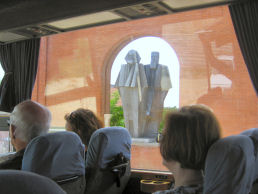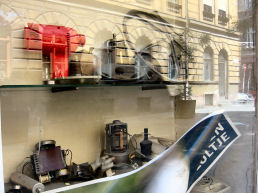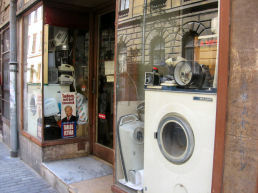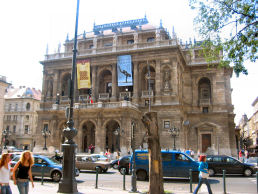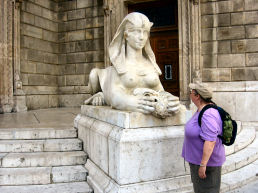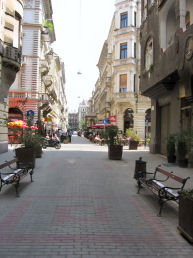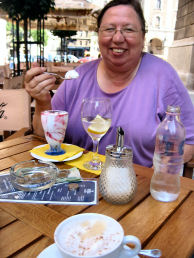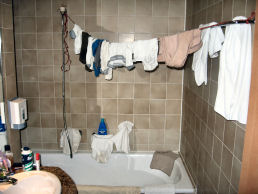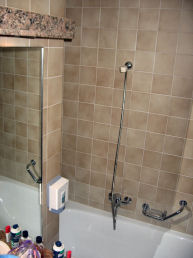I managed to sneak onto the Internet using the "dlink" network. The signal was considerably stronger than the previous evening. I eventually realized that the strength of the signal was a function of the computer’s location rather than the time of day. I downloaded my e-mail and sent one to my dad. I also sent a copy of the one that I had sent from Prague. He had written me that he had not received it.
Whoa, Nellie! I was stunned to discover good news on La Repubblica’s website about A.C. Siena, the Italian soccer team that I had loyally followed since its supporters had disrupted an Andrea Bocelli concert that we attended in 2003. On that evening the team had clinched promotion to Serie A for the first time in a century. By winning the last game of its season against Lazio the Siena squad had managed to avoid getting relegated to Serie B by the margin a single point over a thirty-eight game schedule. I could hardly believe this; the team had played very poorly in the second half of the season, and Lazio was one of the best teams in the league all year. Evidently Lazio played pretty hard, but the Tuscans were not to be denied. They had kept me and their other fans on pins and needles like this every year. I could not understand why they always seemed to wait until the last game of the year to play well. Essentially the same thing had happened when we were in Italy in 2003. Siena beat Atalanta in the last game, and the victory was just enough to let them stay in Serie A.
I forgot to bring my camera with me down to breakfast. The room in which we ate was more elegant than usual. This was by far the largest hotel we had stayed at, so I did not recognize many of the people in the dining room. The selection was similar to what was offered by the other hotels. Sue and I ate with Patti and Tom. Tom told us that he had decided to join the group going to the public baths that morning. Patti was going shopping.
I tried to go back to sleep after breakfast, but I couldn't manage to do it; I just lay there for thirty or forty minutes. Meanwhile Sue went to one of the currency changers to get something for her Slovak crowns. I gave her most of the small fortune in forints that I had been toting around with me. She got some Croatian kunas and some euros to use in Slovenia. The rest she took in dollars. We just had to hope that there would be enough money in our bank account to cover the EFT for the mortgage payment that I knew would come through in early June. I checked the bank account on the Internet. It appeared to me that we would squeak by. There was little that we could do about it from Hungary. I went outside and took a few photos of Pesti Lampás, the courtyard restaurant across the street that had provided us with the unlikely combination of speedy, delicious, entertaining, and relaxing supper the previous evening. Sue and I decided to take the 11 a.m. bus to the Statue Park. We walked the few blocks to Deák Ferenc Tér. On the way we passed the exchange office in which Sue had disposed of her Slovakian korunas and my excess forints. I took a photograph of her with the clerk who helped her out. At the busiest intersection we took the "subway," which was an underground pedestrian passage beneath the traffic. We had previously encountered them in London and Rome. This seemed to me to be another European idea that Uncle Sam should emulate. I suspected that anyone who had struggled to cross 34th and Seventh Avenue in New York or just about any major intersection in Boston would appreciate using such a subway. It also provided a location for a few retail stores.Unbeknownst to me, we had walked through Deák Ferenc Tér with Elemer the previous day. It was gigantic. We began to wonder how we might find the right bus. Rick Steves’s book said that the bus stop would have the Statue Park logo. We never saw any such thing. Fortunately we did spot Rawlins and Angela sitting near two buses. They told us that they had heard that neither of those buses was the one that we wanted, but they also said that the right bus would eventually arrive there. We chatted with them a bit while we waited. The bus finally arrived at a little after eleven. It was already nearly full of lazy passengers who had apparently been picked up at their hotels. The bus driver waved us onto the bus. I could not understand how he knew that we were waiting for his arrival. A lady sitting near the driver soon announced that we were on the right bus. That was a relief. Up until then there had been a real paucity of feedback about this setup. For all we knew Putin had sent the bus to take us back to the work camp at Recsk. It seemed to take the bus forever to traverse the half mile from Deák Ferenc Tér to Buda. Because of the one-way streets, the driver was forced to execute five consecutive right turns. We finally crossed the Elizabeth Bridge and shortly thereafter entered the western suburbs of the city. Once we cleared the bridge it was relatively smooth sailing out to the park, which was located in what seemed to be a relatively deserted area west and south of the city. In fact, however, we could see fairly large houses just beyond the park itself. The whole ride took about thirty minutes. The bus driver never asked us for payment. There was no doubt that we had arrived at Statue Park. Fairly large statues of Marx, Engles, and Lenin were prominently displayed on the outside of the park. At the ticket booth you had a choice of buying a ticket just for admission to the park or combination ticket that included the bus ride back. So, the bus to Statue Park was sort of like the Tappan Zee bridge; you only paid for one way. I surmised that this allowed them to hire bus drivers who were not fluent in Tourist.
The first thing that we saw after entering the park was a Trabant (Trabi) automobile. These rattletraps were built in East Germany, and they were prevalent throughout the Soviet bloc.
Not a single customer was inside the park until the people who arrived on the bus began to file in. We never noticed anyone enter during our thirty minutes in the park either. Evidently everyone agreed with Rick Steves’s advice that reaching the park via public transportation was too complicated to deal with. That must mean that the lady running the ticket booth only worked for about thirty minutes a day, or maybe an hour during the summer, and the park would be empty essentially all the rest of the time. Surely creative Hungarian capitalists could figure out a more efficient approach than that. Inside the park were twenty or thirty Soviet-era statues. Many of them exhibited the familiar muscle-bound frames, bare chests, and grimly determined looks. Smiles were nowhere to be seen. I knew that it was considered bad form to like this style, but I could not help myself. Something about it has always intrigued me. In the 1970’s I had a collection of twenty posters from the Russian revolution. I really liked them until Tom’s dog Corey peed all over them. Sue and I used Rick Steves’s book as a guide as we strolled among the statues for about half an hour. Angela and Rawlins went at their own pace. Rawlins had torn out and brought with him the pages from the guide book that described the statues. I brought my whole book. We both concluded that the park must have slightly rearranged the statues since the text had been written.
My favorite works were the soldier in the overcoat near the entrance, the zombie-like figure busting through the wall, the gigantic sprinting worker with the flag, and the much more modern and satiric work that Imre Varga had produced. He obviously pulled the wool over everyone’s eyes. The Communists laborers and fighters that he depicts are black, sullen, and anonymous. The Austrians are shiny, wealthy, and gay.
At one point I climbed up on the pedestal of a statue of a man pointing his finger. I then stood behind the statue in order to take a photo looking down his arm. By an odd coincidence Sue was walking directly across the courtyard from him. I showed her the picture in the camera’s little display. It appeared as if he were pointing at her. We decided to construct a little scenario of it. She posed for me blindfolded in front of the firing squad wall.
The forty minutes that the bus tour allowed was just about the right amount of time to view the statues at a leisurely pace. It was a pleasant and relaxing experience. One could explore whatever one wanted at whatever speed felt comfortable. So few people were there that it was quite easy to take photographs that included no unwanted tourists. They even let you climb on the statues, although I think that I was the only Ugly American who dared to do so.
The operators of the park had obviously chosen capitalism over communism. They forced you to exit the park through the gift store. For sale were a great many South Park tee shirts with satirical communist themes. They had quite a few more authentic knickknacks as well. The most attractive ones to me were the silver flasks with red stars or hammers and sickles on them. However, they seemed a little pricey, and I was afraid that if I bought one, Ann Coulter might turn me in. One guy tried to board the bus without having bought the ticket that allowed him to go home. The driver made him go back to the ticket booth and buy one.
The return trip was much faster. I doubt that it lasted more than fifteen minutes. The one-way streets were all in our favor when we were going east. The bus stopped back at Deák Ferenc Tér, and we got off.
We soon encountered Harlyn and Audrey. They had eaten lunch at Centrál Kávéház, the coffee house next to the hotel. They were on the way to a place near the opera house for dessert.
Rawlins, Angela, Sue, and I were also ready for lunch. I pulled out my trusty guide book and looked for a likely restaurant in the vicinity of the square. At first we decided to go to Bohémtanya, but when I read the words "smoke-filled" everyone vetoed it. Maybe I should have continued reading the next line in which the non-smoking room for the tourists were mentioned. Instead we went to Duran Svendvics, which was an interesting place. One built one’s lunch plate by pointing at whatever looked good. They had Diet Coke to drink, and, mirabile dictu, it was even cold. I got a small piece of pizza and an open-faced sandwich that had caviar on it. They were both reasonably good. It was the first time that I ever had caviar. I grew up in Kansas, all right?
We ran into Lauren, Nedra, and Barbara in the restaurant. Lauren seemed to be really thrilled with the establishment. I suspected that she planned to add a superlative or two to the listing in the 2008 version of the guide book.
After lunch Rawlins and Angela planned to take the Metro to some destination that I forgot to note. Our plan was to tour the Hungarian State Opera House, which was near the Metro station. Rawlins was elected as the designated guide. He quickly and decisively led us to the Metro station. At that point Sue and I bade adieu, or rather viszontlátásra, to our boon companions. At the first intersection we checked the street signs against our map. We were not where we thought we were. Rawlins had led us to the wrong Metro station. It was, however, easy for us to adjust our plan and approach the opera house from the rear. On the way we encountered some strange stores, including one that seemed to sell weird-looking spare parts and another that had in its display window several machines that appeared to be at least fifty years old.We had quite a bit of time before the tour of the opera house was to begin at 3:00. We seated ourselves on some benches on the side street just east of the opera house. We could hear opera singers practicing familiar arias — "O mio babbino caro" and "Caro nome" — overhead. It was almost an other-worldly experience.
We
While we waited for the tour to start, we spent some time in the Opera House's amply supplied gift shop. They had a very large collection of opera CD’s for sale. If I were not so cheap, I may have bought one or two that would be difficult to find in the U.S. I talked myself into thinking that they would be available on the Internet. Sue purchased some postcards.
Some people were in the opera house before the guided tours began. They must have had a private tour. We could also hear some performers rehearsing, and we could hear people applauding their efforts. By the time that the tour started, however, they had all disappeared.The leader of our tour group called herself Wilhelmina. The English-speaking group, which included a fair number of camera-toting Japanese who did not seem to understand English, was so large that they had to split it into two sections. It appeared that there was absolutely no one in the Italian group. I was tempted to take the personal Italian tour and act as a translator for Sue. I was afraid that I might embarrass myself by misinterpreting something the guide said.
It cost extra to buy a pass to take photos. I decided not to purchase one.
Wilhelmina and all of the other guides wore modest brown shifts. However, rolled-up blue jeans were clearly visible beneath Wilhelmina’s skirt.
Our tour began in the auditorium. Wilhelmina told us quite a bit about the history of the building, including the fact that it contained only seven kilos of real gold; everything was just gold plate. I was more interested in the stage itself. It was twice as deep as the auditorium. The curtains were open, so much of it was visible. The stage hands were moving scenery and equipment around for the night’s performance. At one point a trap door opened, and a large vehicle rose from the depths on an elevator. I would have been content to just sit and watch them work for the duration of the tour, but that was not the plan.
We saw the royal box, the old smoking area, and several corridors and waiting areas. These things might have been interesting to others, but I had trouble paying attention. To me they were just rooms. We then walked through a room that had books behind glass with sketches of old productions. I was much more interested in this, and I dallied for as long as I could. We also saw a small museum with busts of Hungarian performers. I had never heard of any of them. Someone asked who the most famous performer to appear here was. The name that Wilhelmina gave was unfamiliar to me.
The most interesting fact that we learned was that Empress Elizabeth (Sissi to the Hungarians), after whom one of the bridges and our hotel were named, loved Budapest and loved opera. Her husband, Emperor Franz Joseph I was at best ambivalent about the former and hated the latter.
After the tour we returned to the side street through which we had walked to reach the opera house. We stopped at a sidewalk café for a little pick-me-up. I ordered a cappuccino, and Sue had some ice cream and a bottle of water. My cappuccino was barely drinkable; Sue thought that her ice cream was OK but not great. On the other hand, one could not beat the atmosphere. We could see the tourists up on Andrássy Út, but we had the entire sidewalk café to ourselves. The waiter was close enough that we could call him over, but not so close that we had to worry about him overhearing what we were talking about. I found it quite soothing.After the tour we took the blue line Metro back to Deák Ferenc Tér using the pass that Susana had provided us. Once again we were faced with very fast very long escalators. As in Prague the Metro seemed to be on the honor system.
When we got back to the hotel I signed onto the Internet and downloaded my e-mail. There was a somewhat disturbing e-mail from Denise. There was nothing that I could do about the situation either here or back at the office, so I tried to put it out of my mind.
We hooked up with the Corcorans for supper at Centrál Kávéház. Tom was surprised when I told him that it was right next door. Tom and I ordered the mixed grill, which consisted of chicken, beef, and something else along with sauerkraut, red cabbage, and potatoes. They had Carlsberg on tap, so I tried it. It was OK, but it was still probably the worst brew of the entire trip. Tom had dark beer. Patti ate some kind of a stuffed pancake. She had a caffé latte to drink. Sue ordered veal cutlet with asparagus and baked mashed potatoes with nutmeg. She also had a glass of white wine. The three of them also ordered desserts.
The coffee house was a rather pleasant experience. Most of the other diners appeared to be locals. I had to wonder if they ordered off of a different menu. The prices seemed rather high. I can hardly imagine that many natives would be willing to pay so much for their supper on a regular basis. Maybe they only ordered coffee and/or dessert. There seemed to be more talking going on than eating.
Tom told us at supper that Steve Sharp had lost his credit cards. He had to cancel all of them. Evidently the Sharps did not think that they would need them on the rest of the trip.
At some point during the day I overheard Andy say that he had hurt himself running up and down the minaret in Eger.
I was hoping that someone might do something to take away my title of Jerk of the Tour. These two pieces of information stoked my hopes a little, but I feared that I had built an insurmountable lead in the early rounds. Someone would need a knockout blow to wrest the title from me at this point. The police would probably need to be involved.
After supper Tom used the men’s room. Patti and Sue went somewhere. Evidently they told me where they were going, but it was in the middle of their conversation with one another, and I was paying no attention to them. Tom told me to tell them that he was headed to the market named Match to pick up some paprika. I went up to the room. A few minutes later Sue arrived. By that time I was just about ready for sleep, and I had already forgotten that I was supposed to tell her where Tom went. Fortunately she and Patti must have run into him. Sue and I had a little celebratory party in the hotel room. The main purpose was to dispose of some of the foodstuffs that Sue had horded over the previous few days. We ate potato chips and drank the two beers that she had picked up in Slovakia, Golem and Platny Bažant. Since I had already tasted Platny Bažant at our lunch in Levoča, I let sue drink the mayor of Slanec’s favorite beer. Sue still also had some white wine that she had picked up at the wine tasting.I had noticed that Italians seemed to have an unexpectedly large degree of influence in every one of the cities that we had visited. Others have noticed this, too. I did not expect to see one word of Italian in any of these places. I was certainly wrong.
I finally seemed to be starting to relax a little. I was still a little worried about the situation at work, but I could do nothing about it even if I were there. Sometimes you are a pawn in other people’s games.
